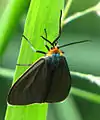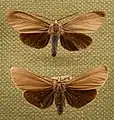Ctenucha virginica
Ctenucha virginica, the Virginia ctenucha, is a moth of the family Erebidae. The species was first described by Eugenius Johann Christoph Esper in 1794.
| Virginia ctenucha | |
|---|---|
 | |
| Adult | |
_Larva-_Guelph%252C_Ontario_02.jpg.webp) | |
| Larva | |
| Scientific classification | |
| Domain: | Eukaryota |
| Kingdom: | Animalia |
| Phylum: | Arthropoda |
| Class: | Insecta |
| Order: | Lepidoptera |
| Superfamily: | Noctuoidea |
| Family: | Erebidae |
| Subfamily: | Arctiinae |
| Genus: | Ctenucha |
| Species: | C. virginica |
| Binomial name | |
| Ctenucha virginica Esper, 1794 | |
| Synonyms | |
| |
Morphology
The wingspan ranges from 40–50 millimetres (1.6–2.0 in).[1] The wing color varies from black to olive brown. The body is a metallic blue green. The head is yellow orange, with feathery antennae. The caterpillar (about 20–25 mm) has multiple tufts of white and yellow hair.[2] It undergoes metamorphosis in May–August.
Range
It is endemic to eastern North America, from Newfoundland south to Virginia. According to the University of Alberta, there has been a westward expansion in the last 60 years as it has reached the Canadian Rockies and is now found in all Canadian provinces.[3]
Food plants
Larvae feed on a variety of host plants including various grasses, irises, and sedges. Adults drink nectar from flowers including goldenrod.[1]
Similar species
- Cisseps fulvicollis – yellow-collared scape moth
- Harrisina americana – grapeleaf skeletonizer
References
- Cotinis (12 July 2020). "Species Ctenucha virginica - Virginia Ctenucha - Hodges#8262". BugGuide. Retrieved November 10, 2020.
- Patch, Edith (1921). A Meadow Caterpillar. University of Maine.
- Schmidt, B. C. & Robinson, E. "Species Details Ctenucha virginica". University of Alberta Museums. E.H. Strickland Entomological Museum. Retrieved 10 November 2020.
External links
- Lotts, Kelly & Naberhaus, Thomas (2017). "Virginia Ctenucha Ctenucha virginica (Esper, 1794)". Butterflies and Moths of North America. Retrieved November 10, 2020.


